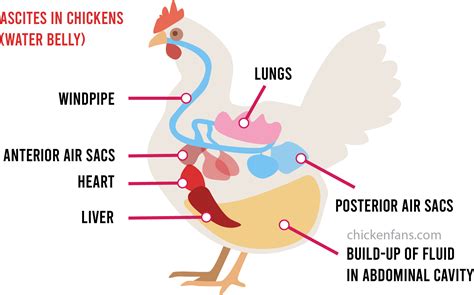Chicken Water Belly: Signs, Symptoms, and Solutions
Chicken water belly, also known as ascites, is a serious condition affecting poultry. Characterized by the accumulation of fluid in the abdominal cavity, it can significantly impact bird health and productivity. This comprehensive guide delves into the signs, symptoms, and solutions for chicken water belly, empowering you to effectively address this concern in your flock.
What is Chicken Water Belly (Ascites)?
Chicken water belly, or ascites, refers to the abnormal buildup of fluid within the abdominal cavity of a chicken. This fluid buildup puts pressure on vital organs, hindering their function and ultimately impacting the bird's overall health. It's a serious condition that can lead to death if left untreated. The condition is more common in broiler chickens raised for meat production but can affect other breeds as well.
Signs and Symptoms of Chicken Water Belly
Recognizing chicken water belly early is crucial for effective management. Here are key indicators:
- Distended Abdomen: The most prominent symptom is a noticeably swollen abdomen. The belly appears abnormally large and may feel tense or tight to the touch.
- Difficulty Breathing: Ascites restricts lung function, leading to labored breathing, gasping, and potentially cyanosis (bluish discoloration of the comb and wattles).
- Lethargy and Weakness: Affected chickens often appear listless, weak, and less active than usual. They may struggle to walk or stand.
- Pale Comb and Wattles: Reduced blood circulation due to organ compression can result in pale combs and wattles.
- Sudden Death: In severe cases, ascites can lead to sudden death without any preceding obvious symptoms.
What Causes Chicken Water Belly?
Several factors can contribute to the development of ascites in chickens:
- Heart Failure: One of the most common causes is right-sided heart failure. This prevents the heart from efficiently pumping blood, leading to fluid buildup. This is often linked to genetic predisposition in broiler breeds.
- Liver Disease: Liver problems can impair the body's ability to process fluids, leading to ascites.
- Kidney Disease: Similarly, kidney dysfunction can result in fluid retention.
- Nutritional Deficiencies: Deficiencies in certain vitamins and minerals can compromise organ function and contribute to ascites.
- Infections: Certain infections can trigger inflammation and fluid accumulation.
- Environmental Factors: High altitudes, extreme temperatures, and poor ventilation can stress the cardiovascular system and predispose chickens to ascites.
How is Chicken Water Belly Diagnosed?
Diagnosis typically involves a physical examination. Veterinarians may use additional tests to confirm the diagnosis and identify underlying causes. These may include:
- Abdominal Palpation: Feeling the abdomen to assess the presence of fluid.
- Blood Tests: To evaluate organ function and identify potential infections.
Treatment Options for Chicken Water Belly
Unfortunately, there's no cure for ascites in chickens once it's developed. Treatment focuses on managing symptoms and improving the bird's comfort. Options may include:
- Supportive Care: Providing a comfortable environment with reduced stress, good ventilation, and appropriate temperature.
- Fluid Management: In some cases, veterinarians may attempt to drain excess fluid, but this is not always successful and can be risky.
- Medication: Depending on the underlying cause, medication may be prescribed to manage heart failure or infections.
Can Chicken Water Belly be Prevented?
Prevention is crucial. While genetics play a role in some cases, implementing the following can minimize the risk:
- Breed Selection: Choose breeds less susceptible to ascites.
- Nutrition: Provide a balanced diet rich in essential nutrients.
- Environmental Management: Ensure proper ventilation, temperature control, and comfortable housing conditions to reduce stress.
- Biosecurity: Maintain good biosecurity to minimize the risk of infections.
What are the Long-Term Effects of Chicken Water Belly?
Chicken water belly significantly impacts a bird's quality of life and reduces its productivity. Even if the condition is managed, the long-term effects can include reduced growth rates, decreased egg production (in laying hens), and a weakened immune system, making them more susceptible to other illnesses. In many cases, the prognosis is unfortunately poor, and humane euthanasia may be necessary to prevent prolonged suffering.
Frequently Asked Questions
Can I treat chicken water belly at home?
No, chicken water belly requires veterinary attention. Home remedies are unlikely to be effective and may delay appropriate treatment.
Is chicken water belly contagious?
Ascites itself is not contagious. However, underlying infections that may contribute to ascites can be contagious.
What is the prognosis for chickens with water belly?
The prognosis for chickens with ascites is often poor. The severity and underlying cause significantly influence the outcome.
By understanding the signs, causes, and management strategies for chicken water belly, you can work towards maintaining a healthy and productive flock. Remember that early detection and prompt veterinary care are crucial for the best possible outcome.

